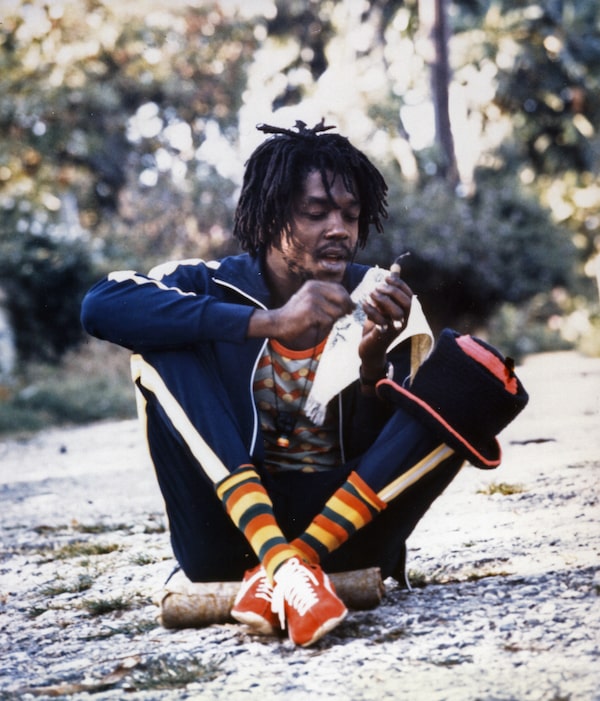In the 1992 documentary Stepping Razor: Red X, the slain reggae star Peter Tosh is hailed in retrospect as a “prophet too deep for his times.” A little much? Perhaps. Then again, Tosh’s 1976 solo album was Legalize It, with a title-song proposition that advocated the sanctioning of marijuana. “It’s good for the flu, good for asthma, good for tuberculosis, even numara thrombosis,” Tosh sang. The Rastafarian and founding member of the Wailers provided no peer-reviewed evidence whatsoever to support his medicinal claims, but, nevertheless, cannabis will be legal in Canada on Oct. 17, the same day the Tosh biography is screened at TIFF Bell Lightbox in Toronto.
On hand for the screening will be the film’s director Nicholas Campbell, an admitted pot smoker and veteran Toronto actor whose career high was the starring role in the long-running CBC series Da Vinci’s Inquest. The Globe and Mail spoke to Campbell this week by phone, about reggae, weed and a secret stash of audio tapes that helped him complete a film he wasn’t sure he was ever going to finish.

Stepping Razor: Red X, a 1992 documentary on reggae musician Peter Tosh.TIFF
Campbell came to reggae while living in England: “I lived there when I was just starting out as an actor. I lived in a kind of Jamaican neighbourhood, where I got to really like reggae music. It was all you could hear in the pubs there. For me, the music replaced Jimi Hendrix and the other stuff I listened to as a teenager. I was lost with the new rock and roll that came after, and reggae came along to replace it.”
A holiday trip to Jamaica gave him the idea for the film on Tosh: “I was living in Los Angeles in the mid 1980s, working on an ABC series The Insiders that was really hard. I just picked up sticks and went to Jamaica for three or four months. Down there I met Wayne Jobson, whose cousin was Dickie Jobson, a partner with Island Records creator Chris Blackwell. He was a great guy and a bit of a hustler who had just sold a story about Peter Tosh for $150. I told him to hold off on the deal, and I pitched the idea to somebody I knew in Toronto. ‘It’s rock ’n’ roll and voodoo,’ I told him. We eventually struck a deal to make the film."
The film changed directions several times before Campbell made a discovery at the house in which Tosh was shot and killed during a 1987 home invasion: “It originally was going to be about a very devout Rastafarian who had worked for Tosh. One day, Tosh turned him out of his house, stripped him of his clothes and cut his dreadlocks. This guy was naked, and he lived 40 miles across the island. I thought that was going to be the movie, but when I started working on it I discovered a bigger story, one in which Peter wasn’t the villain. Then, after shooting this thing for a year, I got into Peter’s house. I found a box of micro-cassettes. Those are what you hear in the movie, with Peter documenting his life. Those cassettes turned the film into something worthwhile.”
Tosh had a “huge ego,” according to Campbell: “Peter saw himself as a prophet. He thought he was the chosen one, and he issued all sorts warnings. He was actually more respected on the street corners than Bob Marley. I find him relevant today, and consistent in the things he said.”
Campbell’s not sure about Ontario taking Tosh’s melodious advice to legalize marijuana: “I’m confused by it. You have the government involved in something they haven’t been my whole life, except to arrest people for it. I don’t know. I guess it’s a good idea. But I’ll still get my weed from the same place I’ve always gotten it. Whenever I’ve needed some, I could always go find it. I don’t think that will change.”
Stepping Razor – Red X, presented by Nicholas Campbell, screens at TIFF Bell Lightbox at 9 p.m., Oct. 17. The screening is free; tickets are available at www.tiff.net
 Brad Wheeler
Brad Wheeler